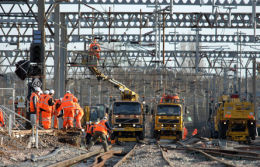Posted 22nd January 2008
Engineering over-runs caused by over reliance on agency staff

Engineers working at Rugby
Over reliance on agency staff by poor performing contractors led to the New Year engineering over-runs at Rugby and Liverpool Street station.
Now Network Rail is planning to bring in-house more specialist OHL - overhead line - engineers and is calling on contractors to reduce their reliance on agency staff for delivery of the big engineering projects.
The company also plans to set up military style command posts for all future major works, with clearer lines of authority.
The moves were announced by chief executive Iain Coucher following the completion of an investigation into what went wrong during major engineering work at Rugby and Liverpool Street Station. There were also over-running engineering works at Shields Junction near to Glasgow.
The Rugby investigation said that the work planned to be done was deliverable with the resources allocated. But the major over-run was caused by:
* Poor productivity from overhead line workers (80 per cent of whom were agency staff) meant the project slipped
* Poor manpower supervision and management on-site added to the problems
* Other big overhead line projects taking place over the holiday meant that there was not the usual pool of external manpower to
draw upon
* Resources were brought in from Network Rail's maintenance organisation to complete the project
Speaking at a specially arranged meeting of its Members - Network Rail's equivalent of shareholders - on Friday, 18 January, Iain Coucher unveiled a package of measures aimed at preventing a repetition of the over-runs which affected the travelling of thousands of passengers on the West Coast and Great Eastern routes.
The key points of the action to be taken by Network Rail include:
* Network Rail will increase its in-house capability in key specialist engineering disciplines. Specifically, overhead line (OHL) engineers
* Contractors will have to reduce significantly their reliance on agency staff for the delivery of big engineering projects
* Military-style command posts will be set up for all future major works, delivering clearer lines of authority
* Train and freight operating companies will be invited to have greater involvement at every stage of a project
* Key specialist engineering resources, such as overhead line, will be overseen nationally by Network Rail
Meanwhile, The Office of Rail Regulation is investigating complaints from Virgin West Coast managing director Chris Gibb that his company was not given sufficient notice from Network Rail that an extra day would be needed at Rugby. In fact four more days were needed before the route opened to trains.
The ORR is also investigating whether the West Coast modernisation can be completed on time during 2008.
During the holiday period Network Rail says it embarked on the most intensive programme of engineering work for many years.
There were 35 major schemes and more than 5,000 rail engineers worked 1.2 million man hours over the holiday period.
Iain Coucher said: "We invested almost £125m in the railway during the Christmas holidays aimed at improving train services. Over 1,000 pieces of work were undertaken and all but three went well. That is three too many in our book.
"We let passengers and freight users down and I'm determined that it won't happen again. That is why we will be taking these far-reaching and decisive measures in the weeks and months ahead."
The specially arranged meeting was arranged to enable the executive management team of Network Rail to report back to Members on internal investigations into the network disruptions as soon as possible.
It also enabled members to raise questions and challenge the team face-to-face on the overruns.
At its board meeting on 16 January the executive directors also reported in depth to the full board of Network Rail where there was lengthy discussion on the issue.
